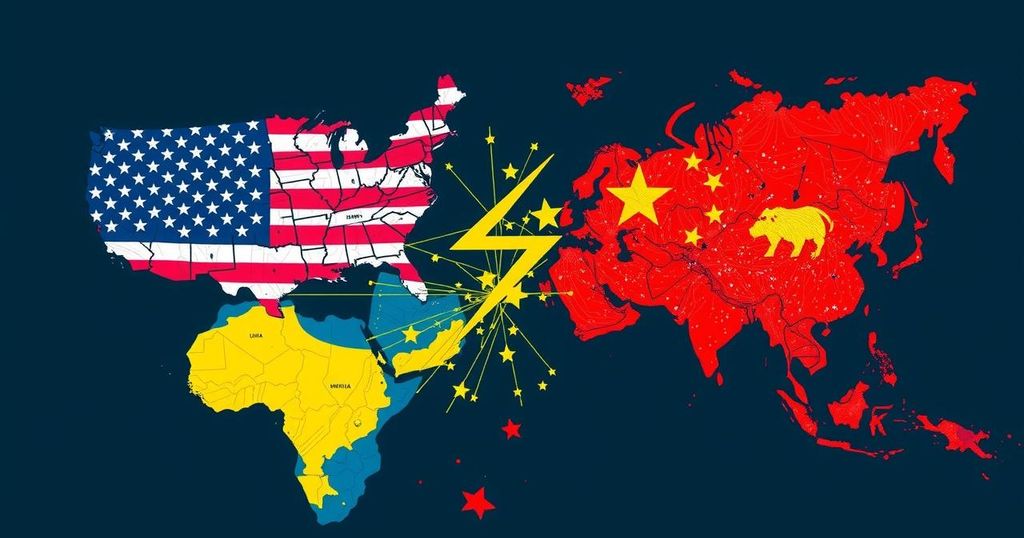President-elect Donald Trump has threatened a 100% tariff on BRICS nations if they attempt to create or support a currency alternative to the U.S. dollar. This comes in light of ongoing efforts by these countries to lessen their reliance on the dollar. Economists warn that implementing such tariffs could harm U.S. consumers by increasing prices and potentially accelerate the move away from dollar dependence among other nations.
On November 30, President-elect Donald Trump announced his intention to impose a 100% tariff on the BRICS nations if they pursue the creation or support of an alternative currency to the U.S. dollar. The BRICS group encompasses Brazil, Russia, India, China, South Africa, and includes Egypt, Ethiopia, Iran, and the United Arab Emirates. Trump articulated this position on Truth Social, emphasizing the need for these countries to commit to not developing a rival currency.
This announcement follows previous threats from Trump to impose tariffs on Canada, Mexico, and China, aimed at compelling these nations to contribute more substantially to curbing unauthorized immigration and illicit drug flows into the United States. The primary intention behind the proposed BRICS tariffs is to maintain the dominance of the U.S. dollar as the world’s reserve currency, which has traditionally bestowed significant economic and geopolitical advantages upon the United States.
The BRICS coalition, formed in 2009 with the intent of elevating the economic status of emerging market economies, has expressed interest in diminishing reliance on the U.S. dollar. This desire has been articulated by various leaders including Russian President Vladimir Putin, who proposed a new international payment system in light of perceived U.S. financial hegemony. Moreover, Brazilian President Luiz Inácio Lula da Silva has suggested the formation of a new currency for South America to facilitate trade without dependence on the dollar.
However, the feasibility of a new BRICS currency remains questionable due to the dollar’s entrenched status in global markets. It currently constitutes approximately 58% of global foreign exchange reserves, and essential commodities such as oil and gold continue to be traded predominantly in dollars. Mark Weinstock, a professor of economics at Pace University, remarked on the impracticality of BRICS nations swiftly developing an alternative reserve currency given their disparate economic conditions and the trust global investors place in U.S. debt.
Recent comments from South African officials have attempted to downplay the urgency of establishing a BRICS currency, clarifying that discussions are focused on trading among member countries utilizing their national currencies rather than creating a new singular currency.
The implications of Trump’s proposed tariffs on U.S. consumers could be significant. Economists warn that while the likelihood of such tariffs being enacted remains low, their implementation would likely result in increased prices for goods imported from BRICS nations, thereby fueling inflation. Key imports from these countries include Brazilian coffee, Chinese electronics, and South African minerals.
Critics of Trump’s stance argue that such threats could diminish U.S. credibility on the global stage. Brad Setser, a senior fellow at the Council on Foreign Relations, articulated that the coercive nature of the tariff threats could inadvertently undermine the dollar by framing its usage as a concession to the U.S., which might accelerate efforts among other nations to move away from dollar reliance.
Overall, Trump’s tariff threat against the BRICS nations signals an effort to fortify the dollar’s dominance in global trade. However, this approach has elicited concerns regarding its potential unintended consequences for both U.S. economic consumers and the dollar’s standing in international finance.
The article discusses President-elect Donald Trump’s threat to impose a 100% tariff on the BRICS nations if they pursue efforts to replace the U.S. dollar with an alternative currency. The BRICS nations, which include Brazil, Russia, India, China, South Africa, as well as Egypt, Ethiopia, Iran, and the United Arab Emirates, have shown interest in reducing their dependence on the dollar. The importance of the dollar as the world’s dominant reserve currency provides significant economic advantages to the United States, prompting the administration to take a firm stance against any moves that may challenge this status.
In conclusion, Trump’s proposed 100% tariff on BRICS nations highlights a significant concern over maintaining the U.S. dollar’s status as the world’s primary reserve currency. While the likelihood of such tariffs being enforced is questionable, the potential rise in consumer prices and the erosion of U.S. standing in global economic discussions are critical considerations. As some BRICS members downplay the urgency for a new currency, the geopolitical and economic ramifications of this discord remain to be seen.
Original Source: www.cbsnews.com






